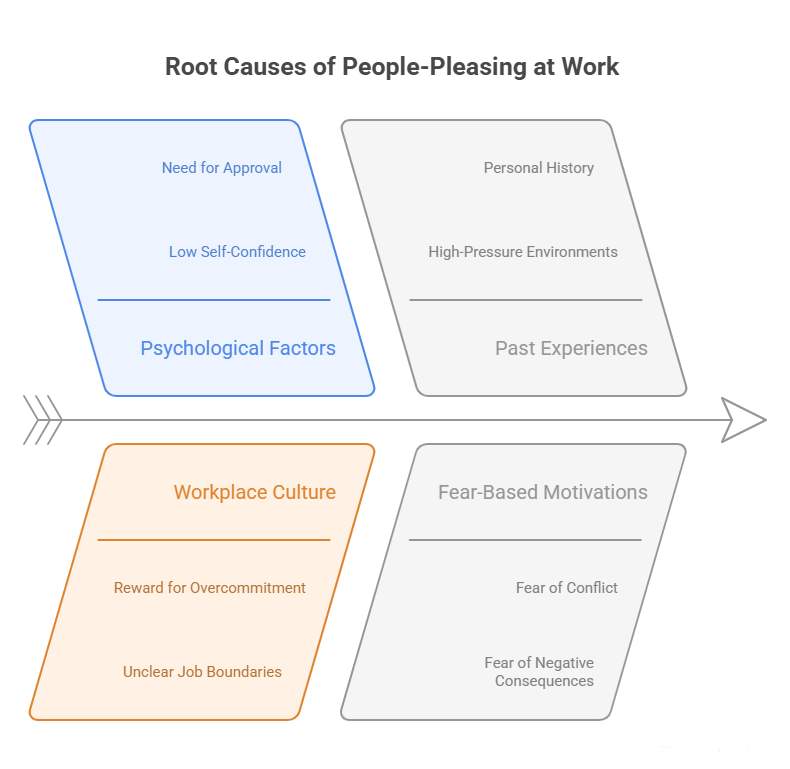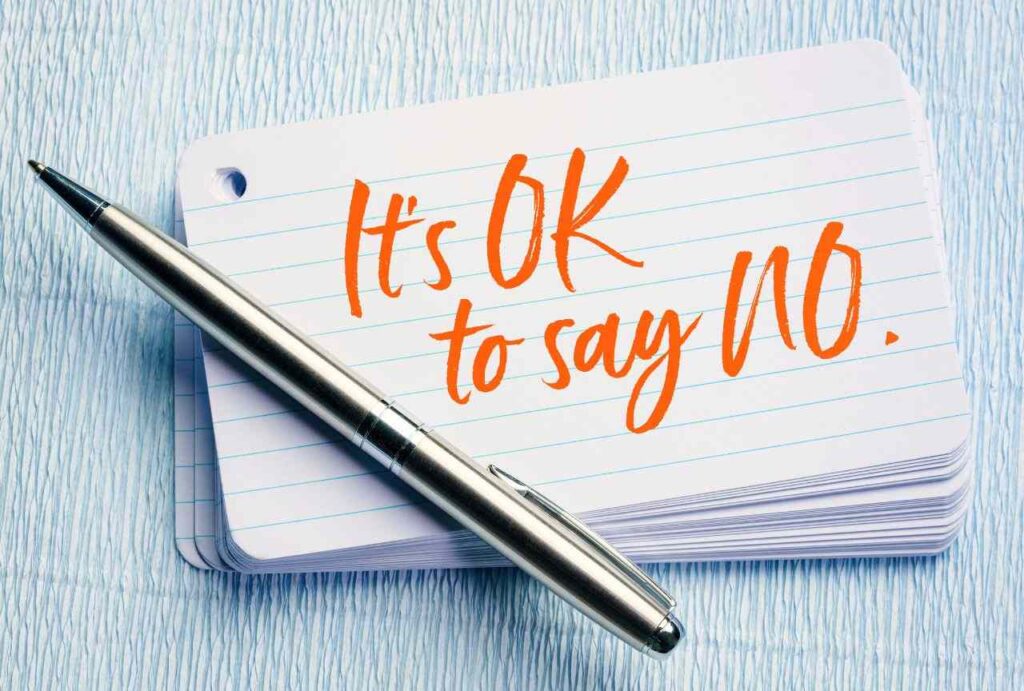Feeling pressured to meet every request at work can slowly turn your day into a cycle of stress, overcommitment, and frustration. Many employees fall into the habit of people-pleasing without even noticing it. The constant yes-responses, the fear of disappointing colleagues, and the urge to keep everyone satisfied can lead to burnout, performance issues, and stalled career growth.
People-pleasing at work is not a small habit. It affects workload, confidence, communication, and the way others treat you professionally. If you often say yes even when your plate is full, take on tasks that interrupt your priorities, or avoid speaking up when something is not workable, you are not alone. This is a common pattern across workplaces, and it can be changed with the right structure and tools.
This breaks down how to stop being a people pleaser at work using practical, realistic, and proven strategies. These insights go beyond generic advice and focus on actions you can apply immediately to protect your time, strengthen your confidence, and improve your performance.
I. How People-Pleasing Shows Up at Work
People-pleasing often appears through patterns and daily behaviors that quietly undermine confidence and productivity. These signs help you pinpoint what needs attention:
- Saying yes automatically to tasks, meetings, or requests without evaluating capacity
- Taking extra work to avoid disappointing others, even when deadlines are already tight
- Prioritizing coworkers’ needs above your own responsibilities, leading to unfinished tasks
- Avoiding honest feedback during discussions because you worry about reactions
- Staying silent during decisions, even when you have valid input
- Seeking validation from managers or colleagues before moving forward with tasks
- Apologizing for normal delays or for things that are not your responsibility
- Feeling anxious when someone seems unhappy or dissatisfied, even briefly
- Reworking tasks excessively to maintain approval and avoid criticism
- Handling issues that belong to others because you feel obligated to keep peace
- Overextending your availability, such as responding outside working hours
- Supporting every request during team stress, even when it affects your own workload
These behaviors may seem small individually, but they shape how others perceive your boundaries, availability, and confidence at work.

Also Read: How To Refuse Tasks At Work and When It’s Your Right
II. Why You People-Please at Work (The Real Causes)
Understanding the root causes gives you clarity and direction. People-pleasing is often driven by deeper factors linked to self-worth, workplace culture, and past experiences. The following points outline the most common reasons:
- Fear of conflict or tension: You prefer avoiding potential disagreement, even when it’s necessary for clarity or workflow.
- Fear of disappointing others: You link your value to how satisfied others are with you at all times.
- Low self-confidence: You question your ability to say no or to set limits, worrying it might be viewed negatively.
- Need for external approval: You rely on positive reactions from coworkers or managers to feel secure in your role.
- Previous work environments: High-pressure or controlling workplaces may have taught you to overextend yourself to stay safe or valued.
- Perfectionism: You feel responsible for ensuring everything runs smoothly, even when tasks go beyond your role.
- Unclear job boundaries: When roles are not well-defined, taking on extra work can become a habit.
- Misinterpreting loyalty: You associate hard work with never declining requests, even when it harms your productivity.
- Workplace culture: Teams that reward constant availability or overcommitment make people-pleasing feel like the only path to acceptance.
- Fear of negative consequences: You assume that saying no will affect performance reviews or relationships.
- Personal history: Experiences outside work may have shaped a pattern of prioritizing others to maintain stability or acceptance.

Knowing these causes helps you select the right strategies, build healthier boundaries, and improve your professional confidence.
III. 7 Effective Ways to Stop Being a People Pleaser at Work
1. Pause Before Saying Yes
A pause is one of the strongest tools for breaking automatic yes-responses. It gives you space to assess what is being asked before committing.
- Take a short moment before responding to any request, even if it feels minor.
- Use neutral phrases that allow you to think first, such as:
- “I need a moment to check my schedule.”
- “Let me confirm what I’m working on today and get back to you.”
- “I need a moment to check my schedule.”
- Evaluate whether the request fits your priorities, deadlines, and capacity.
- Consider whether someone else is more suitable for the task or if it aligns with your role.
- If it creates overload, choose a clear response rather than reacting from pressure.
- The pause helps you break the habit of responding out of anxiety, obligation, or fear of disappointing others.
- Over time, this technique builds confidence and reinforces that your time has value.
This simple shift helps you make decisions based on workload, not pressure, which is a critical step toward stopping people-pleasing at work.

Also Read: 5 Secrets Experts Use To Articulate Their Thoughts Clearly
2. Set Boundaries That Are Professional and Measurable
Boundaries are essential for reducing people-pleasing. They define what you can realistically take on and how you work best.
- Identify limits based on your workload, availability, and responsibilities.
- Set boundaries tied to specific actions or times, which removes ambiguity.
- Example: limiting meeting times, email response hours, or workload capacity.
- Example: limiting meeting times, email response hours, or workload capacity.
- Communicate boundaries confidently and calmly so others understand what is workable for you.
- Use clear phrases such as:
- “I can help after I finish the tasks already assigned.”
- “I’m not available for additional work today, but I can review it tomorrow.”
- “I can help after I finish the tasks already assigned.”
- Reinforce boundaries through consistent actions, not only words.
- If someone tries to push past your limits, restate your boundary without over-justifying it.
- Keep boundaries flexible enough to support collaboration but firm enough to protect your focus.
- Track when boundaries are crossed so you can adjust communication if needed.
Professional boundaries improve productivity, reduce stress, and signal to others that your time cannot be accessed without consideration.
3. Learn How to Say “No” Without Conflict
Saying no is an essential skill for anyone who wants to stop people-pleasing at work, and it is possible to decline requests without harming professional relationships.
- Use the “No + Reason + Alternative (Optional)” structure to keep the message clear and respectful.
- Keep your communication short and confident without long explanations.
- Sample approaches include:
- “I can’t take this on today due to current deadlines.”
- “My schedule is full, but you can check with someone who may have availability.”
- “I can’t take this on today due to current deadlines.”
- Stay calm and neutral, even if the other person seems disappointed.
- If you receive pushback, restate your limitation once, then redirect to priorities.
- Focus on facts, such as workload or deadlines, instead of emotions.
- Practice saying no in low-pressure situations to build confidence for more challenging ones.
- Understand that professional boundaries do not equate to disrespect; they show reliability and clarity.
With consistent use, this skill reduces overwhelm, increases productivity, and helps others respect your availability.

Also Read: When Quitting Without Another Job Makes Sense: 7 Valid Reasons
4. Stop Over-Explaining and Over-Apologizing
Over-explaining and apologizing too often weaken your message and make you appear uncertain, even when you are doing nothing wrong. Reducing both habits strengthens your credibility and presence at work.
- Keep your responses short and clear, especially when communicating limits or decisions.
- Avoid long justifications that aim to soften your message. The more you explain, the more you invite negotiation.
- Replace unnecessary apologies with neutral statements.
- Instead of “I’m sorry for the delay,” use “Thank you for your patience.”
- Use direct language that focuses on facts, such as deadlines or workload.
- Practice ending your statements without adding extra clarification.
- Observe situations where you tend to apologize automatically and replace the behavior with a confident alternative.
- Understand that setting boundaries or saying no does not require an apology. It is part of maintaining professional standards.
- Consistency in concise communication signals confidence and encourages others to view your time as structured, not easily influenced by pressure.
This shift helps you communicate more effectively and reduces the emotional weight that people-pleasers often carry.
5. Manage the Fear of Being Disliked
People-pleasing often comes from a deep concern about how others perceive you. Reducing this fear is key to building healthier workplace behaviors.
- Identify situations where approval from others influences your decisions more than your priorities or workload.
- Separate professional expectations from personal feelings. Someone being disappointed does not mean you acted incorrectly.
- Focus on objective performance indicators rather than emotional reactions from colleagues.
- Practice small acts of boundary-setting to build tolerance for discomfort. With time, it becomes easier to handle situations where others may not agree with you.
- Challenge thoughts that assume negative outcomes when you say no. These assumptions are often exaggerated and not based on real evidence.
- Strengthen your sense of self-worth by recognizing your skills, contributions, and results at work.
- Acknowledge that your value is not tied to constant approval or pleasing others.
- Accept that being respected carries more long-term benefit than being liked for overextending yourself.
Managing this fear allows you to make decisions that support your well-being and performance, not just others’ expectations.
6. Build Assertive Communication Skills
Assertive communication is essential for breaking people-pleasing patterns. It allows you to express your needs clearly while maintaining respect for colleagues and workplace goals.
- Use direct language that is calm, confident, and focused on the issue.
- Replace weak phrasing with stronger alternatives:
- “I might be able to” → “I can do this by…”
- “If it’s okay” → “Here is what I can take on today.”
- “I might be able to” → “I can do this by…”
- Maintain steady tone and posture when speaking. Nonverbal cues influence how your message is received.
- State your needs or limitations without minimizing them.
- Stick to one clear point at a time to avoid confusion.
- Practice active listening during discussions so your responses are intentional and grounded.
- Learn to express disagreement respectfully by focusing on facts rather than emotion.
- Assertive communication creates clarity, supports boundaries, and prevents misunderstandings that lead to workload imbalance.
This skill strengthens your professional identity and helps you participate more confidently in team decisions.

7. Hold Yourself Accountable and Track Progress
Changing people-pleasing habits requires ongoing awareness. Tracking your progress helps you build consistency and ensures that new patterns become long-term behavior.
- Set weekly goals related to boundaries, communication, or workload management.
- Keep a simple log of situations where you paused before saying yes, said no, or held a boundary.
- Review the times you struggled so you can identify patterns and adjust your approach.
- Celebrate small improvements. Noticing progress helps reinforce motivation and confidence.
- Evaluate how your workload, stress levels, and productivity change as you stop overcommitting.
- Share goals with a trusted colleague or manager if accountability helps you stay consistent.
- Revisit your boundaries regularly to ensure they still match your responsibilities and goals.
- Tracking your actions turns these strategies into habits rather than temporary changes.
Accountability keeps you focused, supports long-term growth, and ensures that you build a healthier work style that benefits both you and your team.
People-pleasing at work can limit your growth, drain your energy, and weaken the professional presence you are working hard to build. Changing this pattern is not about becoming difficult or less supportive, it is about protecting your time, your focus, and your well-being. Each step you take toward clearer communication and stronger boundaries strengthens your confidence and improves the quality of your work.
Shifting away from people-pleasing is a long-term investment in your career. The more you prioritize balance, clarity, and realistic expectations, the easier it becomes to contribute at your highest level without sacrificing your mental and emotional space. This change matters, and it should not be overlooked if your goal is to grow, perform well, and work with confidence.



